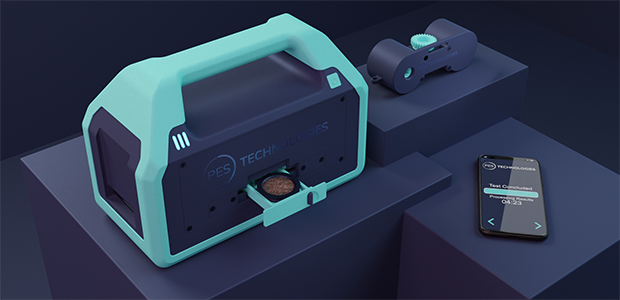
PES Technologies: pioneering soil health with an 'Electronic Nose'
Founded in 2017 by Co-Founder and CTO Dr Jim Bailey, PES Technologies has embarked on a journey to transform the agricultural sector.
This article originally appeared in the July/August issue of Startups Magazine. Click here to subscribe
Specialising in soil health assessment, PES Technologies has developed an innovative sensor device known as the 'Electronic Nose', which will change how farmers and soil scientists monitor and understand soil health.
The journey
Dr Bailey's background in experimental solid state physics initially seemed far removed from the field of soil health. However, after enrolling in the Venture Builder Programme at Deep Science Ventures, a change in direction began to take root.
The programme, designed to break down academic silos and foster interdisciplinary collaboration, paired Dr Bailey with individuals from diverse backgrounds. One pivotal partnership was with an agricultural expert, which changed Dr Bailey’s trajectory to focus on soil health which eventually led to a crucial meeting with the National Institute for Agricultural Botany (NIAB).
Recalling the early days, Dr Bailey noted: "The soil scientists at NIAB highlighted the significant gap in soil health assessment, particularly the biological aspects. Traditional methods were insufficient, and they suggested that my technological background could be the key to developing a new sensor."
Development and sensor capabilities
The ‘Electronic Nose’ device diverges from traditional soil testing techniques such as as reagent analyses in lab and differs from conventional 'smell analysis' such as gas chromatography mass spectrometry. Instead of identifying specific gases, it measures the soil's interaction with its sensors. This approach not only reduces the complexity and cost but also enhances sensitivity and speed.
"Our method allows for direct interaction with soil samples, providing results in just five minutes compared to the weeks required by conventional lab tests."
The device employs advanced machine learning algorithms to deliver easily interpretable metrics like pH, making it user-friendly for agricultural professionals. It houses up to 100 sensors, ensuring each test uses a fresh sensor and minimises maintenance needs.
The peaks and troughs
Developing the sensor was fraught with technical and financial challenges. Early on, in 2018, a proof of concept study with NIAB indicated the potential of the device to measure not just soil biology but also chemical and physical indicators of soil health.
"Those early results were crucial," said Dr Bailey. "They demonstrated that our device could provide comprehensive soil health assessments, which shaped the direction of our company."
However, the road to market was long and arduous. The COVID-19 pandemic posed significant hurdles, particularly in manufacturing and fundraising. Despite these obstacles, PES Technologies secured critical COVID relief grants, which kept the project on track.
Reflecting on the fundraising journey, Dr Bailey remarked: "Fundraising is incredibly challenging, especially in deeptech. Balancing grants and private investment has been key, but securing consistent funding has always been a struggle."
The impact of the ‘electronic nose’
As PES Technologies prepares to ship its first units in September, the Electronic Nose is poised to make a lasting impact. Designed to be energy-efficient and robust, it integrates seamlessly with existing agricultural systems, streamlining soil health monitoring. The device's environmental footprint is minimised through the use of recyclable materials and plans for future innovations include potentially using paper-based sensors.
The primary beneficiaries of this technology are farmers and agronomist (agricultural advisors) who need accurate, quick, and comprehensive soil health data. The device is also attracting interest from international markets from the far East to the Americas.
Looking ahead, PES Technologies aims to expand the capabilities of the sensor device. Ongoing projects funded by DEFRA and Innovate UK are exploring additional applications such as measuring fungal-to-bacterial ratios and soil carbon levels. Dr Bailey envisions a future the device can assess other characteristics important in agriculture, such as potential pest and disease risks in crops.
Advice for aspiring entrepreneurs
Dr Bailey's journey with PES Technologies offers valuable insights for aspiring entrepreneurs, particularly those venturing into deep tech and agriculture.
"Leverage grant funding as much as possible. It provides a more reliable income stream and reduces dependence on private investment, which is notoriously difficult to secure in this sector."
Dr Bailey also emphasises the importance of thorough market research and customer engagement.
"Understanding your customers' needs and the market landscape is crucial. Agriculture is unique, and you need to finely balance long development times with the necessity of building strong relationships with your customers."
PES Technologies' journey highlights the innovative spirit and resilience that is needed to bring advanced technological solutions to market, but it also proves that if you believe in something enough, it is possible to achieve.
The ‘Electronic Nose’ is a labour of love and dedication, offering a new tool for sustainable farming practices and soil health management. As the company continues to innovate and expand, it is set to play a crucial role in the future of agriculture, helping to ensure a healthier, more productive, and cost-effective ecosystem for all.

